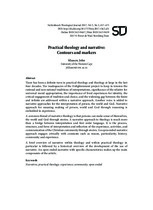Practical theology and narrative: Contours and markers
Abstract
There has been a definite turn in practical theology and theology at large in the last
four decades. The inadequacies of the Enlightenment project to keep in tension the
rational and non-rational traditions of interpretations, significance of the relative for
universal moral appropriation, the importance of lived experiences for identity, the
critical engagement of tradition and choice, and the widening gap between the finite
and infinite are addressed within a narrative approach. Another voice is added to
narrative approaches for the interpretation of person, the world and God. Narrative
approach for meaning making of person, world and God through reasoning is
embedded in experience.
A common thread of narrative theology is that persons can make sense of themselves,
the world and God through stories. A narrative approach to theology is much more
than a bridge between interpretation and first order language. It is the process,
structure, and form of interpretation and reflection of the experience, activities, and
communication of the Christian community through stories. An open ended narrative
approach engages critically with constants such as reason, particularity, history,
community and experience.
A brief overview of narrative within theology and within practical theology in
particular is followed by a historical overview of the development of the use of
narrative. An open ended narrative with specific characteristics makes up the main
components of the article.

